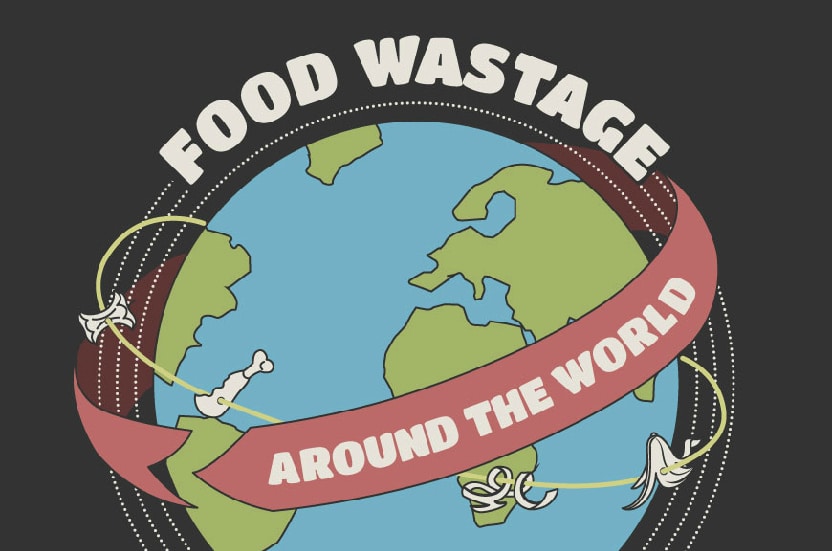
We’re all guilty of wasting a bit of food now and again, whether that’s through cooking too much or not eating something before the best before date. However, it’s a much bigger problem than that, and globally there is around 1-1.2 billion tonnes of food wasted every year. Just imagine what could be done with all that wasted food. And it’s not just the wasted food itself that’s a problem. Think about the associated pollution, money and energy that goes with it.
This infographic looks at all these points, showing how much of a global issue food wastage is, as well as how we can do our bit at home to reduce the amount of food that goes to waste.
We hope that you find this infographic interesting. Scroll down to the bottom of this page for an embed code, sources and full transcript.

Did you realise how big an issue food wastage is? If you have any tips on how we can cut down on the food that goes uneaten, let us know in the comments below.
Sources
FAO. 2011. Global food losses and food waste: Extent, causes and prevention. fao.org FAO. 2013. Food wastage footprint: Impacts on natural resources. fao.org FAO. 2015. Save food: Global initiative on food loss and waste reduction. fao.org IMechE. 2013. Global food: Waste not, want not. imeche.org Newcomer L. 2013. 29 smart and easy tips to reduce food waste. greatist.com UNDESA. 2014. Water scarcity. un.org Word Resources Institute. 2013. Creating a sustainable food future, Reducing food loss and waste. wri.org
Transcript
Food wastage around the world From farms, to supermarkets to forks – a massive proportion of food produced around the world goes uneaten. A global issue Food wastage is a huge problem. 4bn tonnes food produced around the world, per annum Yet due to poor practices, 30-50% of this is wasted. 1.2-2bn tonnes food wasted, per annum Wasting food is a waste of resources. A waste of land 1.4 bn hectares land used to produce uneaten food This is almost 30% of the world’s agricultural land area. A waste of water 250 km blue water (fresh surface and groundwater) used for the agricultural production of food wastage Compared to the world’s largest blue water consumers, food wastage ranks higher than any other country. Food wastage vs. blue water footprint for consumption of agricultural products Considering agriculture uses up 70% of the world’s freshwater supply, for food to be wasted puts further pressure on the 700m people around the world suffering from water scarcity. A waste of energy 3.3 Gtonnes of CO2 equivalent global carbon footprint of food wastage If food wastage were a country, it would rank just behind USA and China. A waste of money US $750bn the direct economic cost of global food wastage (excluding wasted fish and seafood) About 56% of food wastage occurs in developed countries. Food wastage by region (Calories/capita/day) And developed countries are hugely more accountable for consumption-stage wastage. Why the wastage? Food loss and waste occurs throughout the supply chain: In developing countries, the reasons behind production-stage food wastage include: • Financial and managerial constraints • Technical limitations in harvesting techniques • Poor storage and transport infrastructure • Climate conditions For developed countries, reasons include: 1. Agricultural production • Not meeting quality specifications • Damage from pests and disease 2. Post harvest handling and storage • Not meeting quality specifications • Spillage and degradation 3. Processing and packaging • Inadequate shelf life remaining • Food preparation waste 4. a) Wholesale/retail distribution • Damage in transit/storage • Product spoilage • Inadequate shelf life remaining due to low sales 4. b) Food services (cafes, restaurants) • Food preparation waste • Poor inventory management • Plate leftovers 5. At home consumption • Food preparation waste • Past use-by/best-before dates • Preparing too much food • Food spoilage • Plate leftovers How you can help It’s clear that for the developed world, the end of the supply chain is significant. According to the UN-led campaign ‘Think, Eat, Save: Reduce Your Foodprint’, simple actions by consumers and food retailers can dramatically cut the amount of food wasted each year. 1. Plan meals Use shopping lists or meal planning apps, and avoid impulse buys. 2. Buy only what you need Avoid bulk buys, especially with perishable items. 3. Understand expiration dates In the UK, ‘best before’ dates are manufacture suggestions for peak quality. Eat food before the ‘use by’ date, or check if you can freeze it. 4. Compost Compost food scraps, rather than binning them. 5. Reorganise the fridge Move older products to the front of your fridge so you remember to use them up before they expire. 6. Prolong food life Freeze, pickle or preserve surplus fruits and vegetables. 7. Repurpose scraps Turn vegetable scraps into stocks. 8. Use proper storage Airtight containers will help keep cereals or crackers from going stale. 9. Eat leftovers Freeze, or pack leftovers for school/work the next day. 10. Monitor food waste Dedicate a week to writing down what food you throw out regularly – and adjust your buying and storage habits accordingly. The UN’s Food and Agriculture Organization states that: If 1/4 of global food wastage could be saved, that would be enough to feed 870 million hungry people in the world. Especially for developed countries, change is needed. For consumers, this means a change in buying habits. For retailers, this means a change in industry practices. Action to tackle food wastage today can help ensure food security for tomorrow.





